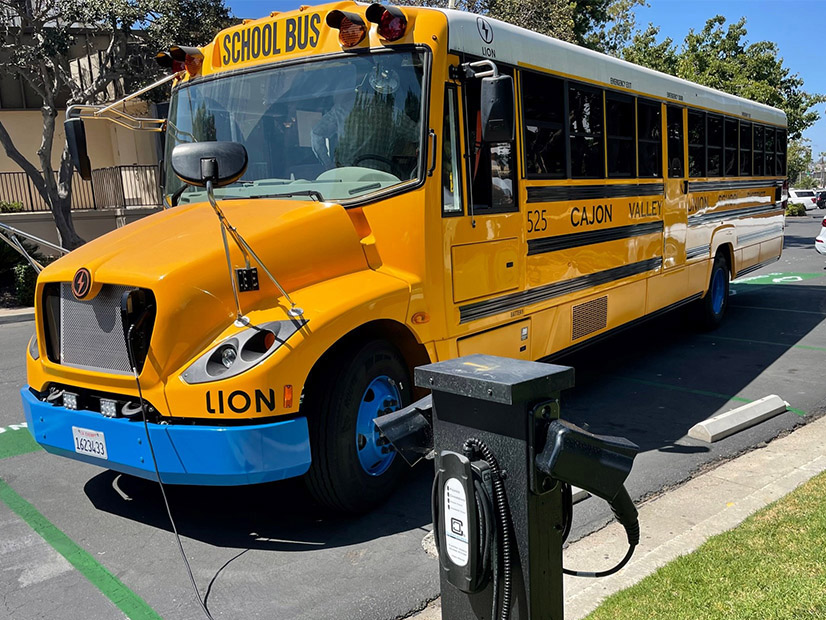New Jersey’s Senate voted Dec. 11 to allocate $15 million from the current state budget for the first year of the state’s long-awaited electric school bus program, in one of the final steps needed to launch the pilot program that will test the use of electric buses in six districts each year.
The Senate voted 22 -10 to approve the minor changes to S3044 that Gov. Phil Murphy (D) recommended in a conditional veto he issued Nov. 27, when the bill landed on his desk. Specifically, Murphy suggested the funds come from the fiscal year 2024 state budget, which runs from July 1 of this year to June 30, 2024, rather than the FY 2023 budget, as originally planned.
The Senate’s funding approval follows the Nov. 30 release of a report on the benefits of using electric school buses in New Jersey. Compiled by Environment New Jersey, an environmental group, and ChargEVC-NJ, an electric vehicle (EV) advocacy group, the report highlights the “significant potential” electric buses offer but cautions they “remain a nascent segment despite high expectations.”
Senate and Assembly votes are needed on the final bill with Murphy’s changes added before it goes back to the governor for signing. Final approval would start a pilot initiative that environmentalists and EV advocates have long urged the state to embrace more quickly due to its potential impact in cutting emissions.
Transportation is New Jersey’s largest source of greenhouse gas emissions, and very few of the state’s estimated 21,000 school buses — which range from Class 2 buses to heavy-duty Class 8 buses —are electric.
Murphy signed a bill, A1282, creating the three-year, $45 million program on Aug. 4, 2022, expecting the legislature to pay the first year of funding from the state’s 2023 general fund. When that allocation was not made, the program remained unfunded. (See Electric School Bus Pilot Awaits NJ Governor’s Signature.)
A1282 requires the New Jersey Department of Environmental Protection (DEP) to create a pilot program under which six districts or contractors each year would transport students to school in electric buses to assess the reliability and effectiveness of using them in place of diesel-powered vehicles.
The performance of the buses would be evaluated on factors such as cost, maintenance, fuel use and speed, and data would be collected and submitted to the DEP. At least half of the districts or contractors would be in low-income, urban or environmental justice communities.
Comparing Costs
The report, “Electrification of New Jersey’s School Buses,” lays out the opportunities and barriers that could affect the pilot program.
The report says electric buses would cut school bus emissions by 74.7% but would not lower emissions to zero as long as some of the electricity powering the vehicles comes from fossil fuel generators. Fuel and maintenance cost savings from running electric buses would be significant, cutting those expenditures statewide by 61.4% or $202.3 million, the report says.
However, the picture on the total cost of ownership (TCO) — the cost over the entirety of the life of an electric bus —is “challenging,” the report says. The “higher up-front costs” of electric vehicles over diesel- or gasoline-fueled vehicles can be mitigated by operational savings. But whether electric buses can compete overall on costs with internal-combustion-engine (ICE) buses depends on several factors, including whether the bus is used for short or long trips, how costs decline in the future and the availability of incentives, the report says.
At current cost levels, EV school buses can “approach parity” with ICE buses only on longer runs, during which the bus uses more fuel. The higher cost of fossil fuel drives up the cost, the report says.
At current costs, an electric bus used on short runs would need an incentive of $143,000 to achieve total ownership cost parity with a diesel bus, and a subsidy of $192,000 to reach parity with a gasoline bus, the report says. For electric buses used on long runs, the incentive would need to be $39,500 to reach parity with a diesel vehicle and $98,500 to reach parity with a gasoline-fueled bus.
If, as some analysts predict, electric bus purchase costs come down in the future, electric buses will be able to compete on short, average-length and long bus routes, the report says. For example, if battery costs are “reduced in 2030 by as much as 50%”, the up-front cost of an electric school bus could be on a “par” with fossil-fueled vehicles, the report said.
In addition, bus operators could reap income from vehicle-to-grid (V2G) revenue by tapping bus batteries to feed energy back to the grid to help address demand peaks, the report says. Electric school buses are well-placed for such demand management efforts because their use profiles are specific and predictable. School buses sit unused for much of the day and are used minimally during the summer months, the report says.
Researchers found the dollar value of such use is not clear, however, with estimates ranging between $500 and $15,000 a year per bus, the report says.



